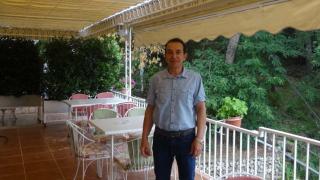Hassan Shiblak wants his lung cancer story to deliver a message of hope for anyone recently diagnosed with the disease. The Long Beach resident has been cancer-free for seven years and credits City of Hope for his success.
Diagnosed with stage 1 lung cancer, Shiblak underwent surgery at a local hospital in 2014. Later that year, he sought a second opinion at City of Hope, where thoracic surgeon and co-director of City of Hope’s Lung Cancer and Thoracic Oncology Program, Dan J. Raz, M.D., M.A.S., performed a second surgery that Shiblak says saved his life.
Shiblak expands on lessons he learned along the way and shares new insights.
- Know your body. “You know yourself better than anyone else, which makes you the best advocate for your health care,” Shiblak said. In his case, he knew something was wrong by the way he was coughing, although he didn’t know exactly what. He immediately sought medical care, which turned out to be a crucial decision.
- Be persistent and proactive. Because Shiblak paid attention to his body, he continued to seek out medical opinions after he was initially told that he had probably had a nosebleed. Early detection, combined with specialized expertise, can make all the difference in lung cancer care. “I was at Stage 1, but if I had waited to get treatment, I could have been at Stage 2 or 3 by the time I was diagnosed, and that would have lowered my likelihood of long-term success,” he said.
- Seek highly specialized cancer care. Shiblak said he benefitted greatly from the unique expertise and individualized care provided by his team at City of Hope. “City of Hope physicians are focused on treating and curing cancer, which is what I wanted,” said Shiblak. “Everyone worked together. They took my concerns seriously, explained all my options, and left no stone unturned. They inspired confidence in me that I had not felt anywhere else I had been treated.”
- Use your strengths. Shiblak is good with numbers. The former Boeing engineer holds two master’s degrees in mechanical engineering and electrical engineering. So, he used his data analysis skills to navigate and better understand the technical aspects of his lung cancer treatment. Shiblak even took a class that taught him how to read his CT scans. Applying his strengths and educating himself about his diagnosis helped Shiblak have better discussions with his doctor and feel more in control of his care, he said.
- Stay as mentally and physically healthy as possible. Shiblak loved exercise prior to his diagnosis and still does. He walks around 200 miles a month, favoring the coastal stretch between Long Beach and Huntington Beach. Shiblak also eats a nutritious diet, with an emphasis on produce and organic foods. He strives to enjoy life every day. “If anything that helped get me through can help someone else or bring them something good, I want to share it.”
Shiblak is grateful to his City of Hope physicians for their ongoing support over the years: Medical oncologist Marianna Koczywas, M.D., thoracic surgeon Dan J. Raz, M.D., M.A.S., respiratory disease specialist Argelia J. Sandoval, M.D., and anesthesiologist Andrew T. Letiner, M.D. Shiblak said, “City of Hope promised to hold my hand and never let go, and they have kept that promise. I feel like I’m forever part of a special family, the City of Hope family.”
Visit CityofHope.org/oc/lung-cancer to learn more about our lifesaving lung cancer screening program and our world-renowned lung cancer experts. To make an appointment at any of our four Orange County locations,click here¯or call:
- Newport Beach Fashion Island: (949) 763-2204
- Newport Beach Lido: (949) 999-1400
- Irvine Sand Canyon: (949) 333-7580
- Huntington Beach: (714) 252-9415
